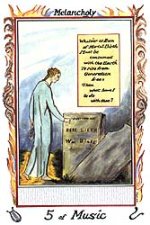Bat Chicken
Buryn's keywords: sorrows and regrets, awareness of mortality, disappointment in love, deep emotional conflict, repressed emotions, need to transcend and move on.
The art from this card is from Blake's illustration of Gray's "Elegy Written in a Country Churchyard". The poem in the block, however, is from Blake's own "Songs of Experience - To Tirzah".
Where Blake's poem is about the desire to abandon the mortal skin in favour of a completeness with Spirit, Gray's Elegy is more about the contemplation of mortality. I'll have more to say about that in the next post.
"To Tirzah" is about dis-connection with the body, with family and mortal concerns; sex, pain, loss. The "Songs of Experience" are the second part of a series of poems that begin with the "Songs of Innocence" which are mainly about childhood and the period of free and unrestrained imagination that is lost in adulthood (Experience). Many of the poems in "Innocence" have their darkened mirror in the "Songs of Experience".
Here is a link to the plate of the original "To Tirzah" from "Songs of Experience":
http://www.blakearchive.org/exist/blake/archive/object.xq?objectid=songsie.z.illbk.52&java=yes
The card may be too hard to read, so here are the words in the block:
In the illustration we see the muse at a tombstone engraved with Blake's own name. With this illustration he is contemplating his own mortality. The words that accompany the original art from Gray's Elegy:
The art from this card is from Blake's illustration of Gray's "Elegy Written in a Country Churchyard". The poem in the block, however, is from Blake's own "Songs of Experience - To Tirzah".
Where Blake's poem is about the desire to abandon the mortal skin in favour of a completeness with Spirit, Gray's Elegy is more about the contemplation of mortality. I'll have more to say about that in the next post.
"To Tirzah" is about dis-connection with the body, with family and mortal concerns; sex, pain, loss. The "Songs of Experience" are the second part of a series of poems that begin with the "Songs of Innocence" which are mainly about childhood and the period of free and unrestrained imagination that is lost in adulthood (Experience). Many of the poems in "Innocence" have their darkened mirror in the "Songs of Experience".
Here is a link to the plate of the original "To Tirzah" from "Songs of Experience":
http://www.blakearchive.org/exist/blake/archive/object.xq?objectid=songsie.z.illbk.52&java=yes
The card may be too hard to read, so here are the words in the block:
Whate'er is Born of Mortal birth
Must be consumèd with the Earth,
To rise from Generation free:
Then what have I to do with thee?
In the illustration we see the muse at a tombstone engraved with Blake's own name. With this illustration he is contemplating his own mortality. The words that accompany the original art from Gray's Elegy:
Far from the madding crowd's ignoble strife,
Their sober wishes never learn'd to stray;
Along the cool sequester'd vale of life,
They kept the noiseless tenour of their way.
Yet ev'n these bones from insult to protect,
Some frail memories still erected nigh,
With uncouth rhymes and shapeless sculpture deck'd,
Implores the passing tribute of a sigh.
Their name, their years, spelt by th' unletter'd muse,
The place of fame and epitaph supply;
And many a holy text around she strews,
That teach the rustic moralists to die.
For who to dumb forgetfulness a prey,
This pleasing anxious being e'er resing'd,
Left the warm precincts of the cheerful day,
Nor cast one longing ling'ring look behind?


